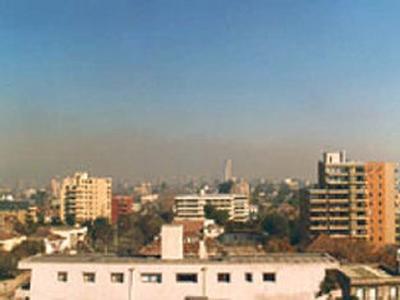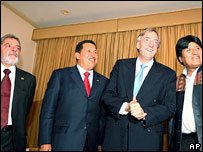Argentine Gas Cuts Force Businesses To Use Polluting Fuels(April 19, 2005) The government of the Metropolitan Region lifted its pollution warning Monday, saying the quality of the air had improved since a pre-emergency was declared the day before.
But this warning could be the first of many this year, as Argentine gas cuts force more companies to use less environmentally friendly fuels.
The state of pre-emergency was announced Sunday morning after the Air Particle Quality Index (ICAP) registered critical levels of pollution at the monitoring station in Pudahuel. Traffic restrictions were imposed and factories were ordered to halt production.
These measures, combined with the usual decrease in emissions caused by traffic and factories during the weekend, caused ICAP figures to fall by one-third by Monday.
“(Sunday’s) ICAP reading signals a change in the atmosphere that happened quicker than expected. This meant businesses could start up again,” said Ximena Rincón, governor of the Metropolitan Region.
But even though the state of pre-emergency was revoked, air quality is expected to get worse in the capital in the coming days and months, resulting in high levels of smog in Santiago.
With winter on the horizon, gas shortages caused by Argentine cuts are becoming a greater problem for Chile’s fuel-consuming businesses.
“Predictions for this year have not been fulfilled because of the energy crisis,” Rincón admitted.
 Executives have been forced to seek cheaper types of fuel after Finance Minister Nicolás Eyzaguirre rejected a bid for subsidies made by businesses affected by gas shortages (ST, March 11). But this will have repercussions on the environment because the alternate fuels emit the most fine and harmful polluting particles, known as PM2.5. Environmentalist Dep.
Executives have been forced to seek cheaper types of fuel after Finance Minister Nicolás Eyzaguirre rejected a bid for subsidies made by businesses affected by gas shortages (ST, March 11). But this will have repercussions on the environment because the alternate fuels emit the most fine and harmful polluting particles, known as PM2.5. Environmentalist Dep.
Guido Girardi from the Party for Democracy (PPD) predicts this winter will be one of the most polluted ever because companies will continue to use petrol instead of natural gas.“There is no way this can be resolved. Pollution will not be tackled until it gets a lot worse than it is now,” he said.
The weather has also played a part in the poor air quality. According to Chile’s Meteorological Directorate, the recent lack of wind will continue at least until Wednesday. Meteorologist Patricio Urra said that during the next weeks, there will not be climatic shift bringing windy weather. “At this time, we don’t have a weather front coming from the coast, which is what we need for better air quality,” he said.
The air quality in Santiago is already worse than predicted, according to reports from the Santiago offices of the National Environmental Commission (CONAMA RM). CONAMA RM Director Pablo Badenier said pollution will get worse toward the middle of the week, but he assured that the authorities were right to withdraw the state of pre-emergency Monday.
“Our team believes that on Wednesday the air conditions are going to get worse because there are always more emissions during the week. We will keep an eye on conditions next week by constantly monitoring the ICAP,” Badenier said.
Critics say that CONAMA RM is not taking the necessary measures to avoid Saturday’s critical levels of pollution. In response, Badenier said it is always difficult to foresee the first states of pre-emergency each year as weather conditions are not always stable, making it difficult to predict when high particle accounts will occur.
“We can’t always be certain our predictions are correct. We weren’t capable of predicting the very bad air conditions on Saturday,” Badenier said.Dep. Girardi, who is a physician, is trying to make La Moneda aware that their current pollution policy will benefit no one.
“Loosening restrictions on emissions, as the government plans to, will create a greater health risk for children with bronchitis and cause cancer and heart attacks in adults,” he said.
Girardi proposes that the government offer tax breaks as an incentive to companies who are prepared to invest money in reducing emissions. He also suggests that companies with the worst pollution records should be moved out of the capital and that PM2.5 particle emissions should be monitored daily.
Article taken from: http://www.tcgnews.com/santiagotimes/index.php?nav=story&story_id=8849&topic_id=1
Questions:
1. What do you think about the pollution in Santiago?
2. Why the pollution is harder year after year?
3. What could you do if the government asked you some help to solve this problem?
DEADLINE: Sunday, May 20th.







